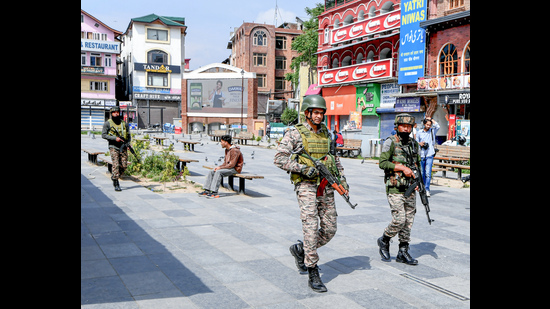QUICKREADS

The Taste With Vir: Why House of The Dragon is a success
Game of Thrones ended with everything tied into a neat little package (comprising some wrong plot-enders, I thought) so that seemed to be that. But such was the impact of the show that the audience cried out for more. House of The Dragon is a consequence of that need. It is a prequel set 200 years before the events of Game of Thrones.

Birthday wishes and a request to Sir David Attenborough
A heartfelt birthday plea to Sir David Attenborough to support social sciences and humanities, highlighting their crucial role in understanding planetary systems, environmental challenges, and the interconnectedness of life on Earth.

After the strikes, what next for Islamabad?
India launched precise counterterrorism attacks in Pakistan, potentially escalating tensions. Pakistan's army chief threatens retaliation amid internal challenges. International mediation seems unlikely, with global powers distracted. Dialogue between military intelligence remains a potential de-escalation pathway.

India-UK FTA could be a template for other deals
India and UK finalize free trade agreement, reducing tariffs on goods like whiskey and textiles. The deal provides market access, incorporates labor rights, and could serve as a template for future international trade partnerships.

Familiar challenges and a new level of response
India launched a strategic military operation against terror hubs in Pakistan following the Pahalgam attack, signaling a robust response to terrorism. The strikes targeted key terrorist centers, demonstrating military preparedness and sending a strong message domestically and internationally about India's resolve.

After Operation Sindoor, India retains escalation dominance
The Indian armed forces conducted Operation Sindoor on May 7, targeting nine terrorist infrastructure sites in Pakistan and Pakistan-occupied Kashmir in retaliation for the Pahalgam terror attack. The operation showcased advanced military capabilities and was executed with precision. While India aims to deter future attacks, potential Pakistani retaliation could escalate tensions, emphasizing the need for diplomatic efforts to maintain peace.

The many messages in Operation Sindoor
India launched Operation Sindoor, conducting pre-emptive military strikes deep inside Pakistan-occupied Kashmir, signaling a new counter-terrorism approach. The unilateral action challenges international expectations, demonstrates resolve, and effectively calls Pakistan's nuclear bluff without escalating to full-scale conflict.

Link West marks India’s strategic pivot in West Asia
India's strategic pivot in West Asia under Modi emphasizes multipolar engagement, strengthening ties with UAE, Saudi Arabia, and Israel. The Link West policy focuses on economic partnerships, defense cooperation, and regional connectivity through initiatives like IMEEC, balancing diplomatic relationships amid complex geopolitical challenges.

Time to reimagine the idea of the Indus
India suspended the Indus Water Treaty after a terrorist strike, citing fundamental changes. The treaty faces challenges due to population growth, water scarcity, and climate impacts. Experts suggest reimagining water governance through collaborative networks and community-driven approaches.

India’s America-China-Pakistan test of balance
Modi navigates complex geopolitical landscape by deepening US ties, cautiously normalizing China relations, and preparing to respond to Pakistan-linked terrorism. Balancing strategic interests, economic needs, and national security through nuanced diplomatic approaches across three critical relationships.

Brands vs influencers ruling goes beyond free speech
The Delhi High Court ruled that evidence-based criticism doesn't constitute defamation, protecting free speech and consumer rights. The judgment challenges corporate intimidation, emphasizes accountability, and recognizes the role of digital actors in shaping market standards and public discourse.

Rich Kerala, poor Bengal, and the role of the party
Kerala transformed from below-average to prosperous through strategic demographic changes, Gulf remittances, and a pragmatic approach to business, while Bengal declined due to anti-business culture and rigid communist policies, resulting in economic stagnation.

In Indus treaty pause, a reality check for Pakistan
India's pause of the Indus Waters Treaty signals escalating tensions with Pakistan after the Pahalgam attack. Both nations are prepared for potential military action, with India considering heightened diplomatic and kinetic responses while Pakistan defensively denies involvement.

Mind the Gap: The weighty business of words (and why they matter)
Advocate Vrinda Grover advocates for a new term to replace ?honour killings,? highlighting the inadequacy of the existing language to describe these caste-based murders. The article discusses the societal pressures on women regarding autonomy and family honour, while also addressing the gendered nuances in language that perpetuate stereotypes. The need for a more precise terminology reflects deeper cultural issues in India.

China question facing India after Pahalgam
China's response to rising India-Pakistan tensions post-Pahalgam terror attack reflects its strategic interests. While initially advocating for restraint, Beijing later reinforced its support for Pakistan, emphasizing their "all-weather" partnership. This contrasts with its earlier stance during the 2019 Pulwama incident. China's actions indicate a desire to exploit India's focus on Pakistan to strengthen its position in border negotiations.

Time for trust and unity, not division and hatred
The author reflects on a friend's distress over government inaction following a violent incident in Pahalgam, urging calm and trust in the government's strategic response. Drawing parallels to India's 1971 military strategy, he emphasizes the importance of careful planning, diplomacy, and social unity amidst rising tensions, advocating for support rather than division in these critical times.






